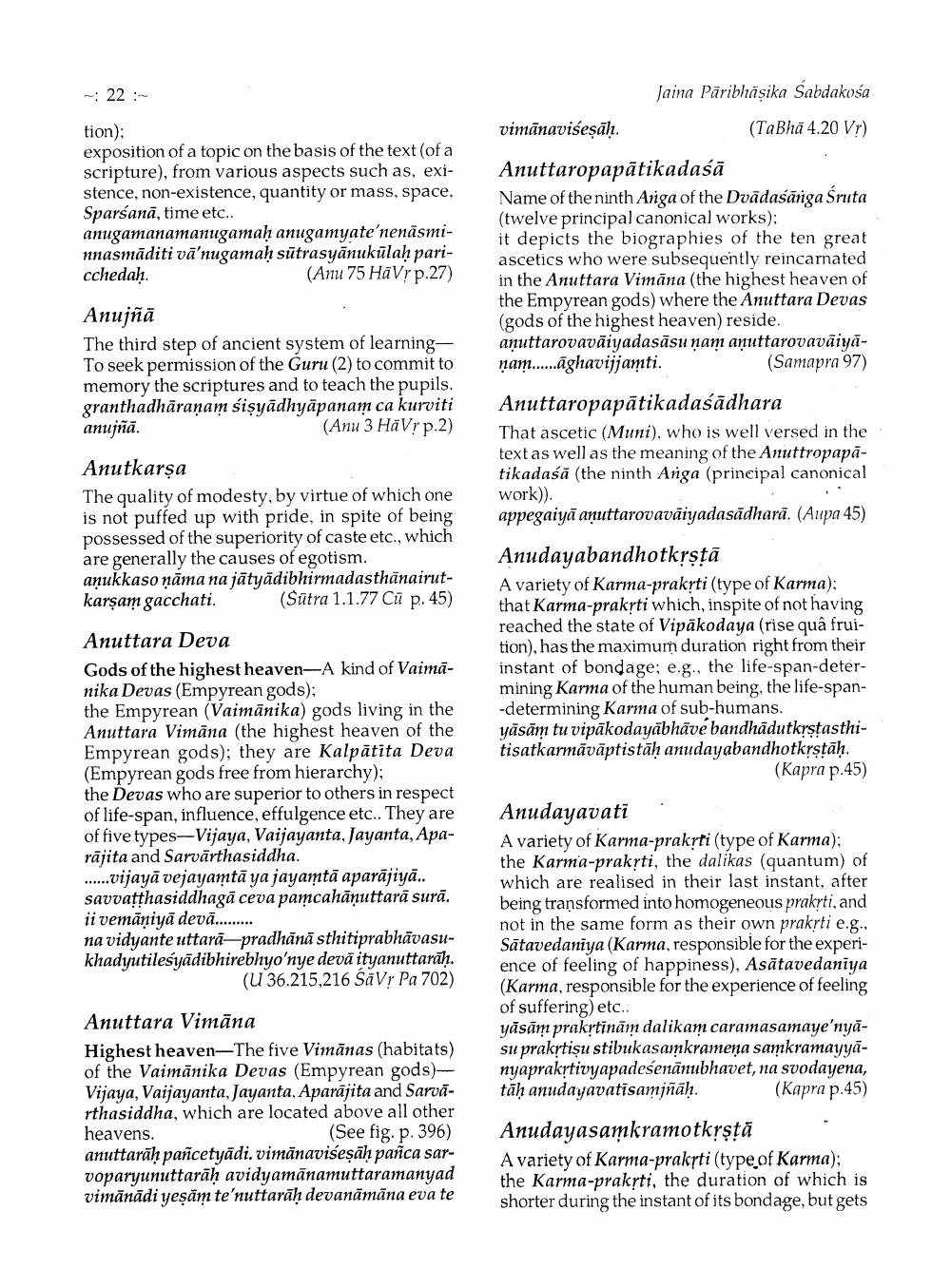________________
22 :
Jaina Pāribhāṣika Sabdakosa
(TaBhā 4.20 Vr)
vimānavišeşāh.
tion); exposition of a topic on the basis of the text (of a scripture), from various aspects such as, existence, non-existence, quantity or mass, space, Sparsanā, time etc.. anugamanamanugamaḥ anugamyate'nenäsminnasmāditi vā'nugamaḥ sūtrasyānukülah paricchedah.
(Anu 75 HāVrp.27)
Anuttaropapātikadašā Name of the ninth Anga of the Dvādaśānga śruta (twelve principal canonical works); it depicts the biographies of the ten great ascetics who were subsequently reincarnated in the Anuttara Vimāna (the highest heaven of the Empyrean gods) where the Anuttara Devas (gods of the highest heaven) reside. anuttarovavõiyadasāsu nam anuttarovaväiyanam......āghavijjamti.
(Samapra 97)
Anujñā The third step of ancient system of learningTo seek permission of the Guru (2) to commit to memory the scriptures and to teach the pupils. granthadhāraṇam śişyādhyāpanam ca kurviti anujñā.
(Anu 3 Hālrp.2)
Anuttaropapātikadasādhara That ascetic (Muni), who is well versed in the text as well as the meaning of the Anuttropapātikadaśā (the ninth Arga (principal canonical work)) appegaiyā aṇuttarovavāiyadasādharā. (Aupa 45)
Anutkarsa The quality of modesty, by virtue of which one is not puffed up with pride, in spite of being possessed of the superiority of caste etc., which are generally the causes of egotism. anukkaso ņāma na jātyādibhirmadasthanairutkarşam gacchati. (Sūtra 1.1.77 Cü p. 45)
Anudayabandhotkrstā A variety of Karma-prakrti (type of Karma); that Karma-prakrti which, inspite of not having reached the state of Vipākodaya (rise quâ fruition), has the maximum duration right from their instant of bondage; e.g., the life-span-determining Karma of the human being, the life-span-determining Karma of sub-humans. yāsām tu vipākodayābhāve bandhādutkrstasthitisatkarmāvāptistāḥ anudayabandhotkystāḥ.
(Kapra p.45)
Anuttara Deva Gods of the highest heaven-A kind of Vaimānika Devas (Empyrean gods); the Empyrean (Vaimānika) gods living in the Anuttara Vimāna (the highest heaven of the Empyrean gods); they are Kalpātita Deva (Empyrean gods free from hierarchy); the Devas who are superior to others in respect of life-span, influence, effulgence etc.. They are of five types-Vijaya, Vaijayanta, Jayanta, Aparăjita and Sarvārthasiddha. ......vijayā vejayamtā ya jayamtā aparājiyā.. savvatthasiddhagā ceva pamcahānuttarā surā. ii vemāniyā devā....... na vidyante uttarā-pradhānā sthitiprabhāvasukhadyutilesyādibhirebhyo'nye devä ityanuttarāḥ.
(U 36.215,216 SãV? Pa 702)
Anudayavati A variety of Karma-prakrti (type of Karma); the Karma-prakrti, the dalikas (quantum) of which are realised in their last instant, after being transformed into homogeneous prakrti, and not in the same form as their own prakrti e.g., Sātavedaniya (Karma, responsible for the experience of feeling of happiness), Asātavedaniya (Karma, responsible for the experience of feeling of suffering) etc. yāsām prakrtinäm dalikam caramasamaye'nyasu praktisu stibukasamkramena samkramayyānyaprakrtivyapadesenānubhavet, na svodayena, tāḥ anudayavatisamjñāḥ. (Kapra p.45)
Anuttara Vimāna Highest heaven-The five Vimānas (habitats) of the Vaimānika Devas (Empyrean gods)Vijaya, Vaijayanta, Jayanta, Aparajita and Sarvarthasiddha, which are located above all other heavens.
(See fig. p. 396) anuttarāḥ pañcetyādi. vimānavišeşāh pañca sarvoparyunuttarāḥ avidyamānamuttaramanyad vimānādi yeşām te'nuttarāḥ devanāmāna eva te
Anudayasamkramotkrșță A variety of Karma-prakti (type of Karma); the Karma-prakyti, the duration of which is shorter during the instant of its bondage, but gets




